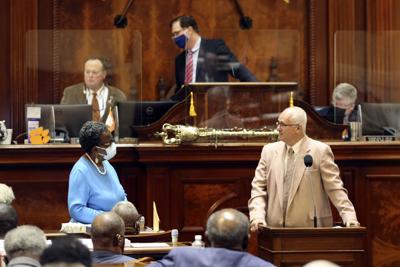COLUMBIA — A bill requiring South Carolina college students to take a course on American history passed April 15 after legislators added instruction on the Black "freedom struggle" to the reading list.
The House voted 91-12 on the amended measure, a day after the chamber halted debate over whether to add the Reconstruction era following the Civil War to the list of what the course must include.
Rep. Gilda Cobb-Hunter, D-Orangeburg, proposed adding five essays on Reconstruction and John Hope Franklin’s 1947 “From Slavery to Freedom” — what she called the "premier historical document" on the era — to the course’s required reading. Republicans countered specifying what book must be used in a class could be seen by accreditors as legislative meddling, or at least rekindle colleges' opposition to the years-long effort.
"We can't throw a lot into it because if we do, it’s going to kill it," Rep. Tim McGinnis, R-Myrtle Beach, said April 14 before putting the debate on hold.
The compromise hashed out between a group of Democrats and Republicans added a single line to the bill, which requires the reading of at least one document considered "foundational to the African American freedom struggle."
The bill already required reading — in their entirety — the U.S. Constitution, the Declaration of Independence, and the Emancipation Proclamation, as well as at least five essays from the Federalist Papers.
Cobb-Hunter still has concerns with the bill, saying "it is still too loose for my taste of who defines what’s foundational."
"The people who were part of the Constitution and originally included in the Constitution didn’t include people who looked like me," she said, adding the document also didn't acknowledge women of any color or non-landowners when the Founding Fathers wrote it.
But she opted not to oppose the bill further and, instead, did not vote on it.
Rep. Garry Smith, who's led the effort in the House, said the ideals laid out 245-plus years ago are what Americans should keep trying to achieve.
"This is our promissory note. This is what we've been tasked with, to seek out and try to achieve that promise that's in the Declaration of Independence and Constitution. If you don't know it or know anything about it and what those ideals are that each generation has been working to achieve, then how are you going to achieve it?" said the Simpsonville Republican, who teaches a political science class at North Greenville University in the off-session and has been stunned by how little his students know about the basics of government.
"It's one of the reasons I think we have such division today. We've lost sight of those ideals and the dream of when all God's children are judged by the content of their character and not the color of their skin," he said, borrowing from Martin Luther King Jr.'s 1963 "I Have A Dream" speech.
But Rep. Wendy Brawley, D-Hopkins, said the bill's wording should have specified instruction on Reconstruction, when newly freed slaves "enjoyed fully the rights of their citizenship" and ran South Carolina's government, to include writing a state constitution creating the public school system.
"The amendment talks about the African American struggles, and God knows there are many. We have generations of struggles, but our history also includes pretty significant successes," with the Reconstruction era being one of particular pride, said Brawley, who voted against the bill.
The measure updates a 1924 state law requiring public college students to take a year-long course on America's founding. Beyond reducing that mandate to a semester, the bill also removes reference to the course's final test serving as a loyalty oath to the United States for students who are American citizens.
While the mandate's been law for nearly a century, most of South Carolina's public colleges stopped following it years ago.
The April 15 vote means the legislation is on the verge of becoming law, eight years after Sen. Larry Grooms wrote a letter to University of South Carolina officials asking why the law wasn't being followed.
Civil unrest around the nation over the past year, coupled with colleges no longer opposing a renewed mandate, "propelled the bill further than it’s gone before," said the Berkeley County Republican.
"I believe there are folks on the left and right who do not understand the inner workings of our government and there are some Republicans and Democrats who now understand it’s vitally important that an educated society understand our Constitution, how it works and why we have it," Grooms told The Post and Courier after the House vote.
The Senate passed a similar version unanimously last month. Grooms is hopeful the Senate will simply agree to the House's changes, which would send the measure to Gov. Henry McMaster's desk.
"I'm all for that," Grooms said about adding Reconstruction. "That is part of American history. That's something that should be taught."









